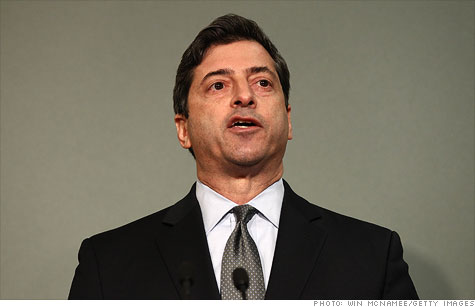Search News

Robert Khuzami, director of the SEC's enforcement division, speaks last month.
NEW YORK (CNNMoney) -- The SEC is about to get tougher on Wall Street crime. A little bit.
The Securities and Exchange Commission said Friday that in certain cases, it will no longer allow defendants to settle complaints without admitting or denying the allegations against them.
The catch is that the change to this controversial policy applies only to cases in which defendants have been convicted of the same conduct in criminal proceedings, or in which they've admitted to the conduct as part of an agreement with law enforcement officials to avoid or delay criminal prosecution.
The SEC does not have the power to bring criminal complaints.
Defendants will still be able to reach SEC settlements without admitting or denying the allegations against them when there are no concurrent criminal convictions or admissions of criminal violations for the same conduct.
The change will prevent a repeat of the awkward scenario last month when Wachovia Bank, now part of Wells Fargo (WFC, Fortune 500), admitted to allegations of bid-rigging in the municipal bond market in a settlement with the Justice Department while simultaneously neither admitting nor denying them in a settlement with the SEC.
Only a "minority" of the agency's cases will be affected by the policy change, Robert Khuzami, director of the SEC's enforcement division, said in a statement. Cases like the SEC's much-maligned settlement with Citigroup last year will not be affected.
"The news is not so much that they're getting rid of this policy -- the news is that they had such a policy to begin with," said Neil Barofsky, a senior fellow at the New York University School of Law and former Special Inspector General of the government's Troubled Asset Relief Program.
In a case against Citigroup (C, Fortune 500), the SEC fined the bank $285 million for mortgage security-related fraud, allegations Citi neither admitted nor denied under the terms of the settlement. In November, however, U.S. district judge Jed Rakoff threw out the settlement in part because he said the "neither admit nor deny" portion deprived the public "of ever knowing the truth in a matter of obvious public importance."
The SEC has appealed Rakoff's ruling, charging that it "ignores decades of established practice throughout federal agencies."
Banks and other defendants in SEC cases press for settlements in which they don't have to admit the allegations against them so that such admissions can't be used as evidence in later lawsuits over the same conduct, for example by investors who claim to have been defrauded.
The SEC, meanwhile, says the policy allows it to save time and resources by reaching settlements more quickly.
"Now, I don't have any particular sympathy for a company facing increased legal risks based on admissions. But there are real costs to refusing to settle cases where we can obtain most or all of the sanctions and other remedies to benefit investors in a case," Khuzami said in a speech last month.
"A settlement removes the uncertainty and puts money in the pockets of investors relatively quickly." ![]()